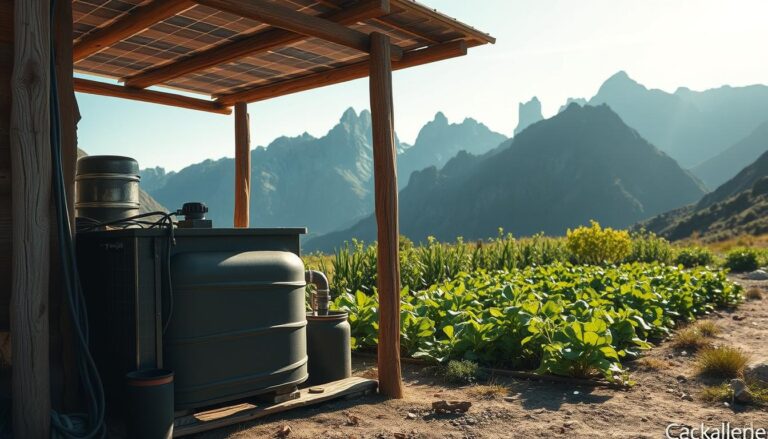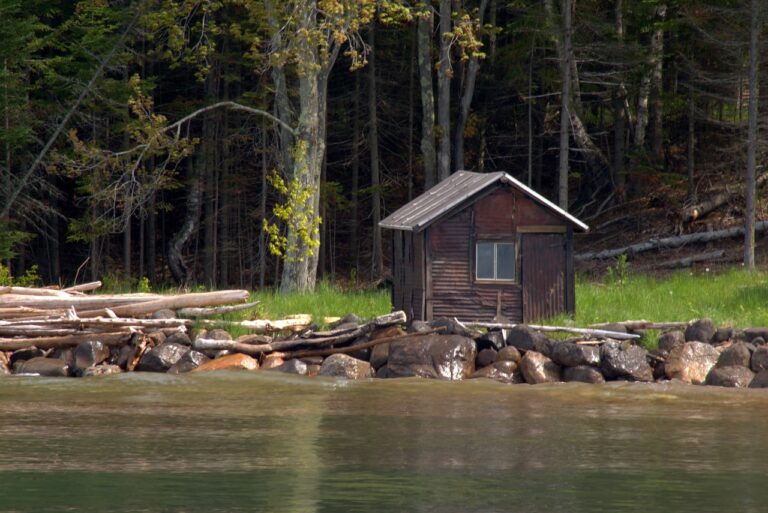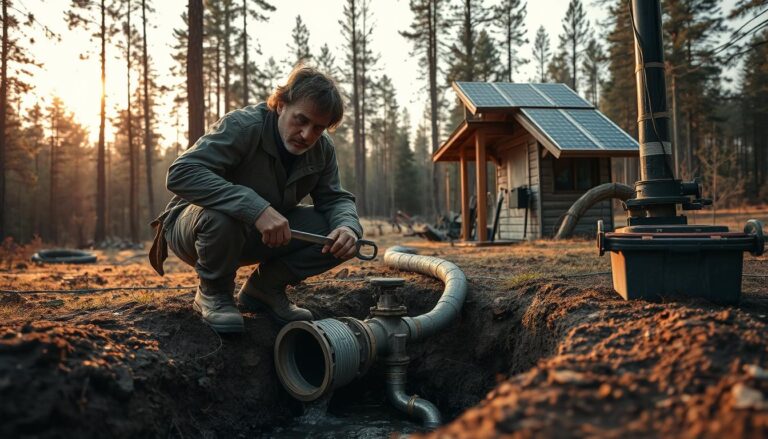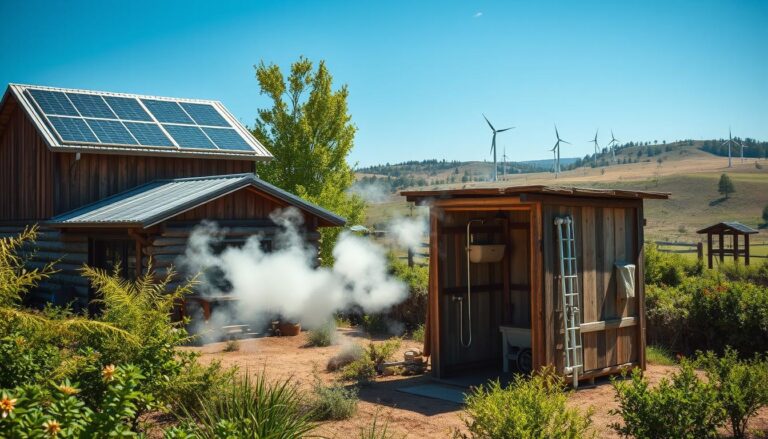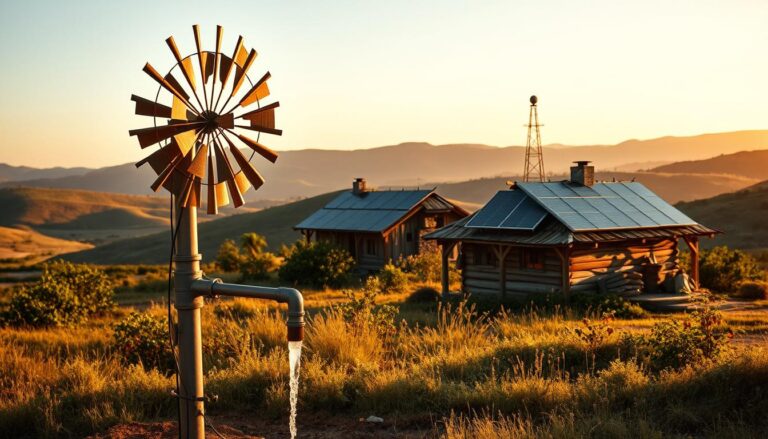How to Keep Water From Freezing Off Grid
For those living off the grid, especially in cold climates, ensuring a steady supply of unfrozen water is a significant challenge. Freezing temperatures can cause pipes to burst and water systems to fail, leaving residents without access to this essential resource.
Imagine waking up on a freezing morning to find your water supply frozen solid. It’s a scenario many off-grid homeowners dread, but with the right strategies, it can be avoided. Effective prevention methods range from simple insulation techniques to more complex underground solutions.
The key is to understand the most effective ways to protect your water supply from freezing temperatures, ensuring a reliable source of water throughout the year.
Key Takeaways
- Effective insulation techniques to prevent water freezing
- Underground solutions for off-grid water systems
- Methods to protect pipes from bursting due to ice
- Strategies for maintaining water supply during harsh winters
- Best practices for off-grid water system maintenance
Understanding the Challenges of Water Freezing Off Grid
Preventing water from freezing is a significant challenge for off-grid systems, requiring careful planning and execution. Off-grid water solutions are particularly vulnerable to freezing temperatures, which can cause pipes to burst and water tanks to become unusable.
To effectively address this challenge, it’s essential to understand the underlying factors that contribute to water freezing in off-grid systems.
The Science Behind Water Freezing
Water freezes when its temperature drops below 32°F (0°C). This process can be influenced by various factors, including the presence of impurities, water movement, and surrounding environmental conditions. Understanding these factors is crucial for developing effective strategies to prevent water from freezing.
Unique Challenges for Off-Grid Systems
Off-grid water systems face unique challenges, such as limited access to resources, harsh weather conditions, and the need for self-sufficiency. These challenges can make it difficult to prevent water from freezing, especially in extremely cold climates.
| Challenge | Description | Impact |
|---|---|---|
| Limited Resources | Off-grid systems often have limited access to resources such as power and materials. | Increases the difficulty of implementing effective freeze prevention measures. |
| Harsh Weather | Off-grid systems are often exposed to harsh weather conditions, including extreme cold. | Increases the risk of water freezing and associated damage. |
| Self-Sufficiency | Off-grid systems require self-sufficiency, making it essential to have reliable freeze prevention measures in place. | Requires careful planning and execution to prevent water from freezing. |
Assessing Your Specific Risks
To effectively prevent water from freezing, it’s essential to assess your specific risks, including your climate, water system design, and environmental conditions. By understanding these factors, you can develop targeted strategies to prevent water from freezing.
Planning Your Off-Grid Water System for Cold Weather
A well-planned off-grid water system is essential for withstanding cold weather conditions. As emphasized by experts, “Proper planning is key to preventing water from freezing in off-grid systems.”
Effective planning involves several critical steps. First, it’s crucial to understand the local climate and assess the risk of freezing temperatures.
Assessing Your Climate and Freezing Risk
Understanding your local climate is the first step in planning your off-grid water system. This involves assessing the average temperature during the coldest months and determining the risk of freezing. For instance, areas with prolonged periods below freezing require more robust solutions for off grid water storage.
Strategic Placement of Water Systems
Strategically placing your water systems can significantly reduce the risk of freezing. This might involve locating pipes and tanks in areas that are naturally more insulated, such as below ground level or in sheltered locations. Proper placement is crucial for maintaining functionality during harsh winter conditions.
Designing with Winter in Mind
Designing your off-grid water system with winter in mind involves selecting materials and designs that can withstand freezing temperatures. This includes using insulated pipes and tanks, and considering off grid water heating solutions to maintain water accessibility. As noted, “Designing with winter in mind is not just about preventing freezing, but also about ensuring a reliable water supply.”
By incorporating these strategies, you can ensure your off-grid water system remains functional throughout the winter months.
Insulation Techniques to Prevent Water Freezing
Insulation plays a vital role in safeguarding your off-grid water system against freezing temperatures. Effective insulation helps maintain the water temperature above freezing, ensuring a continuous supply. This section explores various insulation techniques for pipes, tanks, and containers.
Pipe Insulation Materials and Methods
Proper insulation of pipes is critical to prevent freezing. There are several materials and methods available, ranging from commercial products to DIY solutions.
Commercial Pipe Insulation Products
Commercial pipe insulation products are designed to provide effective thermal insulation. These include foam pipe insulation, fiberglass wraps, and reflective insulation. Foam pipe insulation is particularly popular due to its ease of installation and effectiveness.
DIY Pipe Insulation Solutions
For those on a budget or preferring a more hands-on approach, DIY insulation solutions can be effective. Wrapping pipes with materials like newspaper, foam board, or even old clothing can provide some level of insulation. However, it’s essential to secure these materials properly to ensure they remain in place.
Tank and Container Insulation
Tanks and containers storing water off-grid also require insulation to prevent freezing. Using insulated tanks or wrapping existing tanks with insulation materials can be effective. Insulated tanks are designed to minimize heat loss, keeping the water from freezing.
| Insulation Method | Effectiveness | Cost |
|---|---|---|
| Foam Pipe Insulation | High | Moderate |
| Fiberglass Wraps | Moderate | Low |
| DIY Newspaper Wrap | Low | Very Low |
Natural Insulation Options
Nature provides several materials that can be used for insulation, such as straw, hay, or snow. These materials can be used to insulate pipes and tanks. For example, burying pipes under a thick layer of straw or hay can help keep them from freezing.
By implementing these insulation techniques, individuals living off the grid can significantly reduce the risk of their water supply freezing during the winter months. It’s about choosing the right method based on availability, cost, and effectiveness.
How to Keep Water From Freezing Off Grid Using Heat Sources
In off-grid settings, keeping water from freezing is a significant challenge that can be addressed through various heating methods. Utilizing heat sources effectively can ensure a reliable water supply during cold weather.
Passive Solar Heating Methods
Passive solar heating involves using the sun’s energy to warm water systems. This can be achieved by placing water containers in sunny areas or using solar collectors to heat the water. Passive solar heating is a cost-effective and sustainable method that can significantly reduce the risk of water freezing.

Wood Stove and Thermal Mass Solutions
A wood stove can be an efficient way to heat water off the grid. By incorporating a thermal mass, such as a concrete slab or a large stone, near the stove, you can absorb and release heat, providing a consistent warmth to the water system. This method not only heats the water but also provides warmth to the living space.
Alternative Heating Options for Water Systems
There are several alternative heating options available for off-grid water systems. These include:
- Propane heaters, which can be highly effective but require a propane supply.
- Compost heat systems, which utilize the heat generated from composting organic matter.
Propane Heaters
Propane heaters are a reliable option for heating water off the grid. They can be used to directly heat water or to warm the surrounding environment. However, they require a steady supply of propane, which can be a logistical challenge.
Compost Heat Systems
Compost heat systems are an innovative and sustainable way to heat water. By harnessing the heat generated from the composting process, these systems can provide a consistent and renewable source of warmth. This method is particularly appealing for its environmental benefits.
| Heating Method | Cost Effectiveness | Sustainability |
|---|---|---|
| Passive Solar Heating | High | High |
| Wood Stove and Thermal Mass | Medium | Medium |
| Propane Heaters | Low | Low |
| Compost Heat Systems | Medium | High |
Underground Solutions for Freeze Prevention
One effective strategy for keeping water from freezing off-grid involves utilizing underground solutions. These methods leverage the natural insulation provided by the earth to protect water systems from freezing temperatures.
Burying Water Lines Below Frost Line
Burying water lines below the frost line is a reliable method to prevent freezing. The frost line, also known as the frost depth, is the depth at which the ground freezes in winter.
Determining Your Local Frost Line
The local frost line varies significantly by geographic location. To determine your area’s frost line, consult local building codes or a reliable online resource. This information is crucial for ensuring that your water lines are buried deep enough.
Proper Trenching Techniques
Once you’ve determined the frost line, proper trenching techniques are essential. This includes digging trenches that are deep enough and using materials that can withstand the surrounding soil conditions.
Creating an Underground Water Storage System
Creating an underground water storage system is another effective method for preventing water from freezing. This involves installing tanks or containers below ground level, where they are naturally insulated by the earth.
Underground water storage systems can be particularly effective in areas with harsh winters. By leveraging the earth’s natural insulation, these systems can help ensure a steady supply of unfrozen water even in the coldest conditions.
Circulation Methods to Prevent Freezing
Circulation methods offer a reliable solution to prevent water from freezing in off-grid water systems. By keeping the water moving, these methods help to distribute heat and prevent the formation of ice.
Gravity-Fed Circulation Systems
Gravity-fed circulation systems utilize the natural flow of water due to gravity to keep the water circulating. This method is particularly effective in systems where the water source is at a higher elevation than the point of use. Gravity-fed systems are simple, requiring minimal maintenance, and can be an efficient way to prevent freezing.
Pump-Based Circulation Options
Pump-based circulation options provide an alternative when gravity-fed systems are not feasible. These pumps can be powered by various energy sources, offering flexibility in different off-grid scenarios.
Solar-Powered Pumps
Solar-powered pumps are an excellent choice for off-grid water systems, as they harness renewable energy to circulate water. This not only prevents freezing but also reduces reliance on fossil fuels.
Hand and Foot Pumps
Hand and foot pumps offer manual alternatives for circulating water. While more labor-intensive, these pumps can be effective in small-scale off-grid systems or during emergencies when other power sources are unavailable.
By implementing circulation methods, individuals can significantly reduce the risk of water freezing in their off-grid water systems, ensuring a reliable water supply throughout the year.
Off-Grid Water Storage Solutions for Winter
Off-grid water storage solutions are vital for ensuring a steady water supply during the harsh winter months. Having a reliable system in place is crucial for maintaining access to water, even in freezing conditions.
Indoor Storage Tanks and Containers
One effective way to store water for winter is by using indoor storage tanks and containers. These can be placed in basements, garages, or other indoor spaces that remain relatively warm during the winter. Insulated tanks are particularly useful as they help maintain the water temperature, preventing it from freezing.
For instance, you can consider using off-the-grid water systems that incorporate indoor storage solutions. These systems are designed to be efficient and reliable.
Insulated Outdoor Storage Options
For those who prefer or need to store water outdoors, insulated storage options are available. These tanks are designed with insulation materials that help keep the water from freezing. Some tanks are even buried underground, providing natural insulation against freezing temperatures.
| Storage Type | Insulation Method | Benefits |
|---|---|---|
| Indoor Tanks | Natural indoor warmth | Easy access, less risk of freezing |
| Insulated Outdoor Tanks | Insulation materials | Protects against freezing, versatile placement |
| Underground Tanks | Earth’s natural insulation | Consistent water temperature, hidden from view |
Emergency Water Storage Techniques
In addition to regular storage solutions, having emergency water storage techniques in place can be lifesaving. This includes storing water in smaller, portable containers that can be easily accessed in case of an emergency. It’s also wise to have a plan for melting snow or ice as an additional water source.
“In off-grid living, preparation is key. Having multiple sources of water and storage solutions can make all the difference during harsh winters.”
Power-Efficient Heating Elements for Off-Grid Systems
In off-grid settings, maintaining access to unfrozen water is a challenge that can be addressed with the right heating solutions. Power-efficient heating elements are crucial for minimizing energy consumption while ensuring a reliable water supply.
Solar-Powered Heating Options
Solar-powered heating options are an attractive solution for off-grid systems. These systems harness the sun’s energy to heat water, reducing reliance on other power sources. Solar water heaters can be either active or passive, with active systems using pumps to circulate water and passive systems relying on natural circulation.
Benefits of Solar-Powered Heating include reduced energy costs and a lower carbon footprint. However, their effectiveness depends on sunlight availability, making them more suitable for regions with ample sunlight during the winter months.
Battery and Generator-Backed Heating
For areas with limited sunlight during winter, battery and generator-backed heating systems offer a reliable alternative. These systems can provide heat when solar power is insufficient, ensuring a consistent water supply.
Key Considerations include the capacity of the battery bank, the power output of the generator, and the energy efficiency of the heating elements. Proper sizing and configuration are critical to meet the heating demands without excessive energy consumption.
Low-Energy Consumption Heaters
Low-energy consumption heaters are designed to provide efficient heating with minimal power usage. Examples include thermoelectric heaters and certain types of heat pumps that are optimized for low-energy operation.
When selecting a low-energy consumption heater, it’s essential to consider the coefficient of performance (COP) and ensure it aligns with your energy availability and heating needs.

Emergency Measures When Prevention Fails
Despite best efforts, off-grid water systems can sometimes freeze, necessitating immediate action. Knowing how to respond can make a significant difference in maintaining a reliable water supply.
Thawing Frozen Pipes Safely
Thawing frozen pipes requires caution to avoid damage or injury. Start by identifying the frozen section and turning off the main water supply if possible. Use gentle heat sources like hair dryers or warm towels, avoiding open flames that could cause pipe damage or fires. Monitor the thawing process closely to prevent bursting.
Temporary Water Access Solutions
When pipes are frozen, having temporary water access solutions is crucial. Consider using stored water or alternative sources like rainwater collection systems. Portable water containers and purification tablets or filters can provide a temporary fix until the primary system is restored.
When to Call for Professional Help
Knowing when to seek professional help is vital. If you’re unable to thaw pipes safely, or if there’s significant damage, it’s time to call a professional. Experts can assess the situation, provide necessary repairs, and offer advice on preventing future freezing incidents.
| Emergency Measure | Description | Benefit |
|---|---|---|
| Thawing Frozen Pipes | Using gentle heat to restore pipe function | Prevents pipe bursting and water damage |
| Temporary Water Access | Utilizing stored or alternative water sources | Ensures continuous water availability |
| Professional Assistance | Calling experts for complex issues | Ensures safety and effective repairs |
Conclusion: Maintaining Reliable Water Access Year-Round
Maintaining a reliable water supply is crucial for off-grid homes, especially during harsh winter conditions. By understanding the challenges of water freezing and implementing various prevention methods, you can ensure a steady water supply throughout the year.
As discussed, strategies such as insulation techniques, using heat sources, underground solutions, circulation methods, and off-grid water storage solutions can help prevent water from freezing. For those building an off-grid water system, considerations like flow rate, head loss, water pump pressure, and pipe diameter are essential, as outlined in resources like building an off-grid water system.
By applying these winter water tips off grid, you can safeguard your water supply against freezing temperatures. Effective planning and implementation of these strategies will help you maintain access to water year-round, ensuring the sustainability of your off-grid home.



